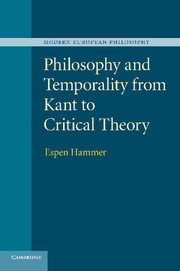Book contents
- Frontmatter
- Contents
- Acknowledgments
- Introduction
- 1 The historicity of time
- 2 Modern temporality
- 3 Two responses to the time of modernity
- 4 Hegel's temporalization of the absolute
- 5 Schopenhauer and transcendence
- 6 Time and myth in the early Nietzsche
- 7 Recurrence and authenticity: the later Nietzsche on time
- 8 Heidegger on boredom and modernity
- 9 A modernist critique of postmodern temporality
- Conclusion
- Bibliography
- Index
4 - Hegel's temporalization of the absolute
Published online by Cambridge University Press: 21 April 2011
- Frontmatter
- Contents
- Acknowledgments
- Introduction
- 1 The historicity of time
- 2 Modern temporality
- 3 Two responses to the time of modernity
- 4 Hegel's temporalization of the absolute
- 5 Schopenhauer and transcendence
- 6 Time and myth in the early Nietzsche
- 7 Recurrence and authenticity: the later Nietzsche on time
- 8 Heidegger on boredom and modernity
- 9 A modernist critique of postmodern temporality
- Conclusion
- Bibliography
- Index
Summary
From late medieval nominalism to Kant, the critique of metaphysics was conducted in many different ways and on the basis of a wide variety of epistemic interests and orientations. As those with only a scant knowledge of history will know, the period between the late fourteenth century and the late eighteenth century witnessed such momentous developments as the rise of experimental, quantitative natural science, the Reformation, the downfall of theocracy, and the rise of liberal political institutions, as well as the emergence of a capitalist system of exchange with its new set of bourgeois values of independence, privacy, and individual rights. From having been viewed, in the Catholic ordo, as a logical expression of God's eternal essence, nature was progressively disenchanted and its languages stripped of predicates that did not conform to the prevailing materialist, commercial, and mathematical-scientific desire to understand and relate to what there is in terms that are expressive not of revelation but of empirical verifiability, instrumental reason, and formal (mainly mathematical) models of thought. Not only did the appeal to the divine lose its explanatory power in most areas of human engagement, but the very idea of there being a divine reality at all that could command absolute authority in issues ranging from the operations of the visible world to the ideal structure of society and the individual's correct conduct within it, slowly but steadily declined and disintegrated, while continuing to do so well into the nineteenth and twentieth centuries.
- Type
- Chapter
- Information
- Philosophy and Temporality from Kant to Critical Theory , pp. 71 - 96Publisher: Cambridge University PressPrint publication year: 2011

